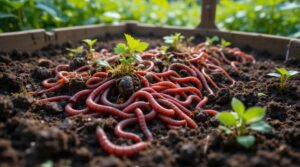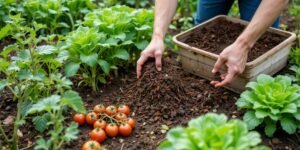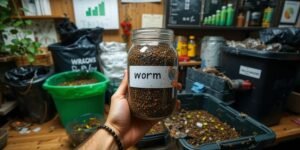Food waste is a growing global concern, with millions of tons of uneaten food ending up in landfills every year. This not only wastes valuable resources but also contributes to greenhouse gas emissions. One effective and sustainable solution to this problem is worm farming. By using worms to break down food scraps, individuals and businesses can significantly reduce waste while creating nutrient-rich compost for soil improvement.
In this article, we will explore how worm farming helps reduce food waste, the environmental benefits of vermicomposting, and practical steps to start a worm farm at home.
The Problem with Food Waste
Food waste is a major environmental issue with severe consequences:
- Landfill Overflow – A large percentage of municipal solid waste consists of food scraps.
- Greenhouse Gas Emissions – Decomposing food in landfills releases methane, a potent greenhouse gas.
- Wasted Resources – Growing, processing, and transporting food requires significant water, energy, and land.
According to the Food and Agriculture Organization (FAO), about one-third of all food produced globally is wasted. Instead of letting food scraps rot in landfills, worm farming provides an eco-friendly alternative.
How Worm Farming Works
Worm farming, or vermicomposting, is the process of using worms to decompose organic waste into nutrient-rich compost. The process involves:
- Worms Eating Food Scraps – Red Wigglers (Eisenia fetida) consume vegetable peels, fruit scraps, and other organic matter.
- Digestion and Breakdown – As worms digest waste, they break it down into smaller particles.
- Nutrient-Rich Castings – Worms excrete worm castings, a powerful organic fertilizer that improves soil health.
This natural recycling method diverts food waste from landfills while producing a valuable resource for gardening and agriculture.
Benefits of Worm Farming in Reducing Food Waste
1. Diverts Waste from Landfills
Instead of throwing food scraps in the trash, worm farming repurposes them into compost. This reduces the amount of organic waste sent to landfills and lowers overall garbage production.
2. Reduces Greenhouse Gas Emissions
Food waste in landfills undergoes anaerobic decomposition, releasing methane, a greenhouse gas that is 25 times more potent than carbon dioxide. Worm farming eliminates methane emissions by breaking down food scraps in an oxygen-rich environment.
3. Creates a Sustainable Composting System
Unlike traditional composting, vermicomposting is faster and requires less space. Worm bins can be kept indoors or outdoors, making them an accessible solution for households and businesses.
4. Produces High-Quality Organic Fertilizer
Worm castings are an excellent natural fertilizer that enhances soil structure, increases microbial activity, and improves plant health. This reduces the need for chemical fertilizers, promoting sustainable agriculture.
5. Supports a Circular Economy
Worm farming is an example of a closed-loop system, where waste is converted into a valuable resource. Instead of disposing of food scraps, they are reused and reintegrated into the environment in a beneficial way.
How to Start a Worm Farm to Reduce Food Waste
Starting a worm farm is easy and requires minimal effort. Follow these steps:
1. Choose the Right Worm Bin
Select a worm bin that suits your space and composting needs. Options include:
- Plastic storage bins – Ideal for small indoor setups.
- Wooden worm bins – Provide better airflow but require more maintenance.
- Stackable tray systems – Maximize space and simplify harvesting.
2. Select the Right Worms
The best worms for composting are Red Wigglers (Eisenia fetida). They thrive in organic waste and reproduce quickly, making them highly efficient composters.
3. Add Proper Bedding
Worms need a moist bedding material to live in. Suitable options include:
- Shredded newspaper or cardboard
- Coconut coir
- Peat moss
- Aged compost
4. Feed Your Worms the Right Foods
Worms can eat a variety of food scraps, but certain items should be avoided.
Good Food for Worms
- Fruit and vegetable scraps (banana peels, apple cores, lettuce)
- Coffee grounds and tea bags
- Crushed eggshells (help balance pH)
- Shredded paper and cardboard
Foods to Avoid
| Food Type | Reason to Avoid |
|---|---|
| Meat & Dairy | Produces foul odors and attracts pests |
| Oily & Greasy Foods | Coats worms, reducing their ability to breathe |
| Citrus Fruits | Too acidic and can harm worms |
| Onions & Garlic | Strong odors and slow decomposition |
5. Maintain Proper Conditions
- Keep the worm bin moist but not soggy (like a wrung-out sponge).
- Ensure good airflow to prevent odors.
- Avoid overfeeding—worms should finish food before adding more.
6. Harvest Worm Castings
After 2 to 3 months, your worm bin will produce nutrient-rich castings. These can be used as:
- A natural fertilizer for plants
- Soil conditioner for gardens
- An ingredient in compost tea for organic farming
Worm Farming for Households vs. Businesses
Worm farming is beneficial for both small-scale household use and larger commercial applications.
| Scale | Setup Type | Waste Processed |
|---|---|---|
| Household | Small worm bin (plastic container) | 2–5 lbs of food scraps per week |
| Community | Medium-sized wooden bin | 10–20 lbs of food scraps per week |
| Business/Commercial | Large worm beds or continuous-flow systems | 50+ lbs of food scraps per week |
Larger operations, such as restaurants, schools, and grocery stores, can adopt worm farming to manage significant amounts of food waste, reducing disposal costs and contributing to environmental sustainability.
Conclusion
Worm farming is a practical, sustainable, and effective way to reduce food waste. By turning kitchen scraps into valuable compost, it diverts waste from landfills, reduces greenhouse gas emissions, and creates a nutrient-rich soil amendment. Whether you’re a homeowner, gardener, or business owner, vermicomposting offers a simple yet impactful way to minimize food waste and contribute to a healthier planet.
If you haven’t started yet, consider setting up your own worm farm and take the first step toward reducing food waste in a sustainable and rewarding way.




